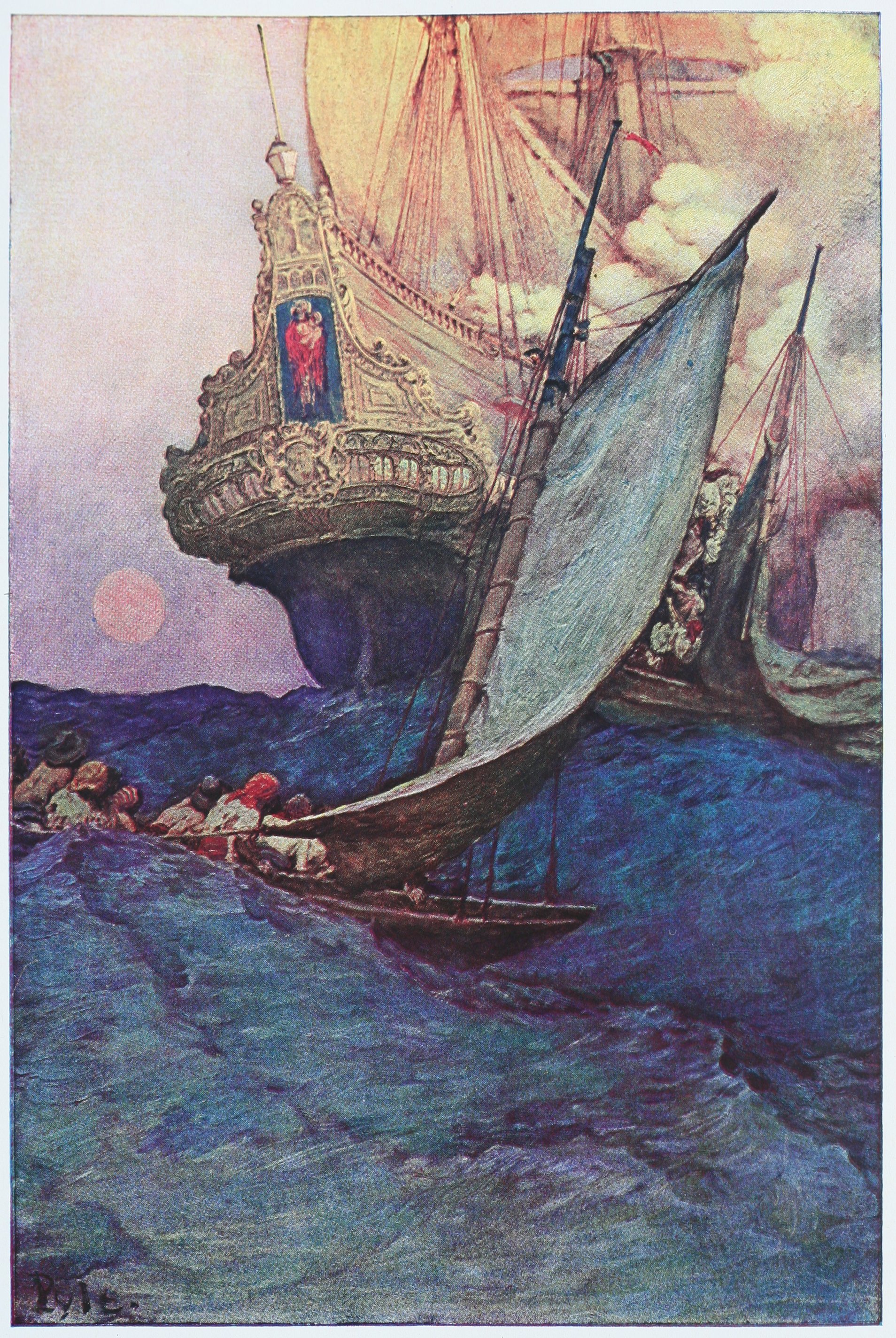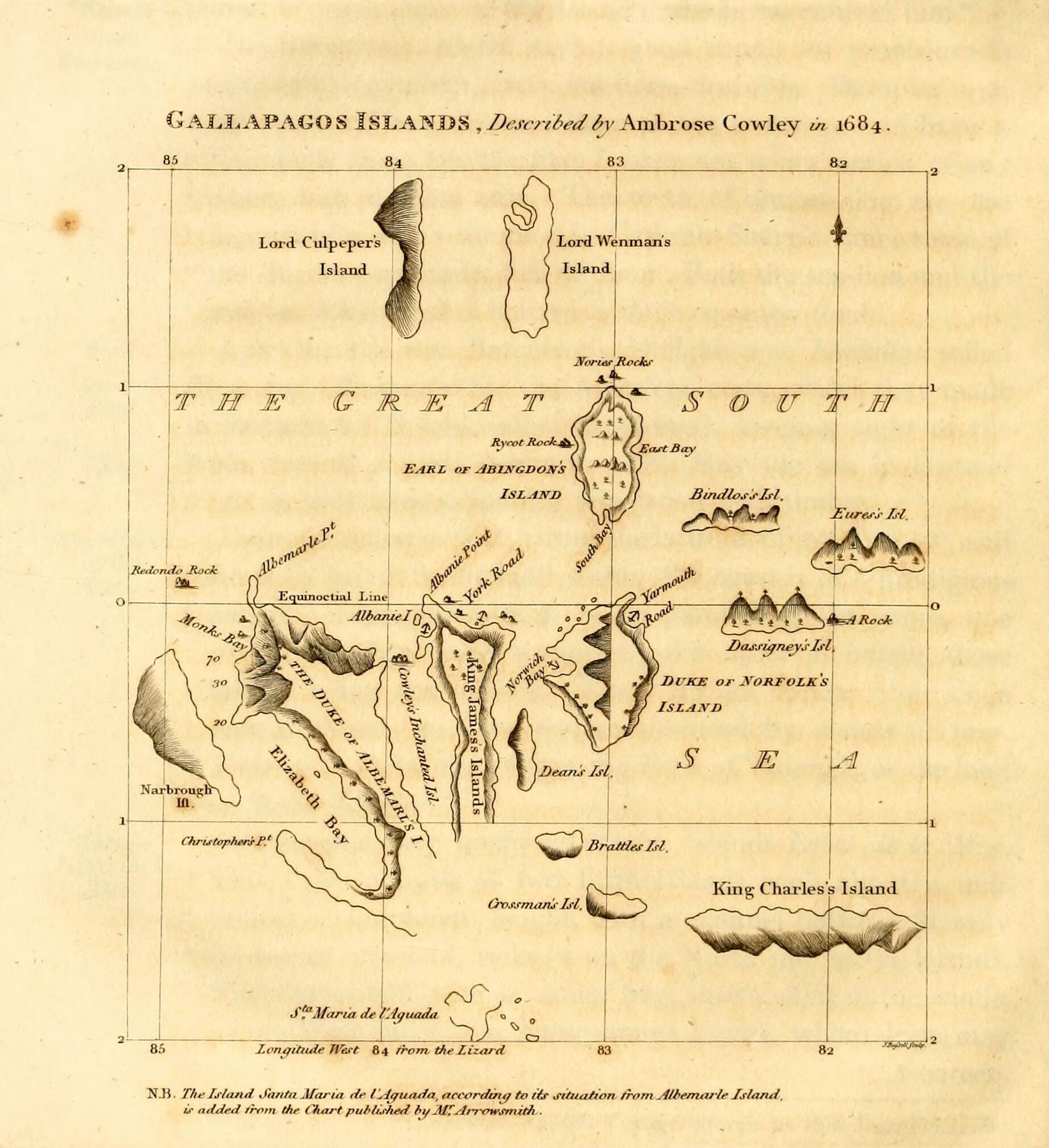|
John Cook (pirate)
John Cook (died 1684) was an English buccaneer, privateer, and pirate. History In 1679, when he was still a merchant captain, Cook abandoned his ship on the island of Bonaire to escape the Spanish. He then joined the assembly of buccaneers serving under Bartholomew Sharpe. The fleet separated in 1681 after disagreements between Captains Sharpe, John Coxon, and John Watling; Cook led a group electing to leave the South Seas and return to the West Indies. Among the sailors joining him were surgeon Lionel Wafer and navigator William Dampier. Cooke then sailed with the crew of William Wright and Jan Willems (aka "Yankey"), serving as quartermaster until granted command of a ship they had taken. Unfortunately, the French authorities of Santo Domingo confiscated the ship for piracy because he had failed to obtain a privateering commission. In 1682 Cook and a few men (including Edward Davis) joined the French captain Jean Tristan, whose boat he stole and sailed to the west coast ... [...More Info...] [...Related Items...] OR: [Wikipedia] [Google] [Baidu] |
Buccaneer
Buccaneers were a kind of privateers or free sailors particular to the Caribbean Sea during the 17th and 18th centuries. First established on northern Hispaniola as early as 1625, their heyday was from Stuart Restoration, the Restoration in 1660 until about 1688, during a time when governments were not strong enough and did not consistently attempt to suppress them. Originally the name applied to the landless hunters of wild boars and cattle in the largely uninhabited areas of Tortuga (Haiti), Tortuga and Hispaniola. The meat they caught was smoked over a slow fire in little huts the French called ''boucans'' to make ''viande boucanée'' – ''jerked meat'' or ''jerky'' – which they sold to the French corsairs, corsairs who preyed on the (largely Spanish) shipping and settlements of the Caribbean. Eventually the term was applied to the corsairs and (later) privateers themselves, also known as the Brethren of the Coast. Though corsairs, also known as ''filibusters'' or ''freeb ... [...More Info...] [...Related Items...] OR: [Wikipedia] [Google] [Baidu] |
Ambrose Cowley
William Ambrosia Cowley was a 17th-century English buccaneer who surveyed the Galápagos Islands during his circumnavigation of the world while serving under several Captains such as John Eaton, John Cook, and later Edward Davis. Cowley published the first chart of the islands in 1684. In his diary he reported the discovery of the mythical Pepys Island, allegedly situated north of the Falkland Islands, prompting a number of mariners to look in vain for the nonexistent land. References *William Ambrosia Cowley. ''Cowley's Voyage Round the Globe'', in ''Collection of Original Voyages'', ed. William Hacke. London: James Knapton, 1699. https://web.archive.org/web/20180120160933/http://www.galapagos.to/TEXTS/COWLEY.HTM *1686 “A Short Account of My Voyage Round this Terestiall Globe of the World from Virginia to England and through the Great South Sea.” In Miscellanea Curiosa. Richmond, Virginia: Virginia Historical Society Mss1. T8525a3, Vol IV (letter written by Cowley describ ... [...More Info...] [...Related Items...] OR: [Wikipedia] [Google] [Baidu] |
English Privateers
English usually refers to: * English language * English people English may also refer to: Peoples, culture, and language * ''English'', an adjective for something of, from, or related to England ** English national identity, an identity and common culture ** English language in England, a variant of the English language spoken in England * English languages (other) * English studies, the study of English language and literature * ''English'', an Amish term for non-Amish, regardless of ethnicity Individuals * English (surname), a list of notable people with the surname ''English'' * People with the given name ** English McConnell (1882–1928), Irish footballer ** English Fisher (1928–2011), American boxing coach ** English Gardner (b. 1992), American track and field sprinter Places United States * English, Indiana, a town * English, Kentucky, an unincorporated community * English, Brazoria County, Texas, an unincorporated community * E ... [...More Info...] [...Related Items...] OR: [Wikipedia] [Google] [Baidu] |
English Pirates
English usually refers to: * English language * English people English may also refer to: Peoples, culture, and language * ''English'', an adjective for something of, from, or related to England ** English national identity, an identity and common culture ** English language in England, a variant of the English language spoken in England * English languages (other) * English studies, the study of English language and literature * ''English'', an Amish term for non-Amish, regardless of ethnicity Individuals * English (surname), a list of notable people with the surname ''English'' * People with the given name ** English McConnell (1882–1928), Irish footballer ** English Fisher (1928–2011), American boxing coach ** English Gardner (b. 1992), American track and field sprinter Places United States * English, Indiana, a town * English, Kentucky, an unincorporated community * English, Brazoria County, Texas, an unincorporated community * Engli ... [...More Info...] [...Related Items...] OR: [Wikipedia] [Google] [Baidu] |
Year Of Birth Missing
A year or annus is the orbital period of a planetary body, for example, the Earth, moving in its orbit around the Sun. Due to the Earth's axial tilt, the course of a year sees the passing of the seasons, marked by change in weather, the hours of daylight, and, consequently, vegetation and soil fertility. In temperate and subpolar regions around the planet, four seasons are generally recognized: spring, summer, autumn and winter. In tropical and subtropical regions, several geographical sectors do not present defined seasons; but in the seasonal tropics, the annual wet and dry seasons are recognized and tracked. A calendar year is an approximation of the number of days of the Earth's orbital period, as counted in a given calendar. The Gregorian calendar, or modern calendar, presents its calendar year to be either a common year of 365 days or a leap year of 366 days, as do the Julian calendars. For the Gregorian calendar, the average length of the calendar year (the mea ... [...More Info...] [...Related Items...] OR: [Wikipedia] [Google] [Baidu] |
17th-century Pirates
The 17th century lasted from January 1, 1601 ( MDCI), to December 31, 1700 ( MDCC). It falls into the early modern period of Europe and in that continent (whose impact on the world was increasing) was characterized by the Baroque cultural movement, the latter part of the Spanish Golden Age, the Dutch Golden Age, the French '' Grand Siècle'' dominated by Louis XIV, the Scientific Revolution, the world's first public company and megacorporation known as the Dutch East India Company, and according to some historians, the General Crisis. From the mid-17th century, European politics were increasingly dominated by the Kingdom of France of Louis XIV, where royal power was solidified domestically in the civil war of the Fronde. The semi-feudal territorial French nobility was weakened and subjugated to the power of an absolute monarchy through the reinvention of the Palace of Versailles from a hunting lodge to a gilded prison, in which a greatly expanded royal court could be more ea ... [...More Info...] [...Related Items...] OR: [Wikipedia] [Google] [Baidu] |
John Read (pirate)
John Read ( fl. 1683-1688) was an English buccaneer, privateer, and pirate active from South America to the East Indies to the Indian Ocean. History Along with navigator and chronicler William Dampier, Read was a crewman aboard John Cook's 1683 privateering expedition which captured a prize ship they renamed ''Bachelor's Delight''. Cook took them around Cape Horn to raid Spain's Pacific territories, joining a flotilla of other buccaneers including Charles Swan's ''Cygnet''. Cook died in 1684, replaced by Edward Davis; Read, Dampier, and others soon transferred to ''Cygnet''. After some unproductive raids Swan headed west across the Pacific in early 1686, his lack of success causing the crew to grow unruly. After a stop at Guam they arrived at Mindanao in the Philippines in June 1686. The crew soon mutinied, ejecting Swan and electing Josiah Teat as Captain, who was himself soon replaced as Captain by Read, setting sail in early 1687. Read sailed Cygnet through the East Indies wi ... [...More Info...] [...Related Items...] OR: [Wikipedia] [Google] [Baidu] |
Cabo Blanco, Costa Rica
The Cabo Blanco Absolute Natural Reserve is a Nature Reserve of Costa Rica, part of the Tempisque Conservation Area in the province of Puntarenas, covering an area of terrestrial and marine on the southern tip of the Nicoya Peninsula near Montezuma-Cabuya and Mal Pais. The site is home to the San Miguel Biological Station which was developed to promote and support teaching, research, and environmental education and has facilities that include classrooms, laboratories and a reference library. The reserve was created in 1963 due to a campaign started by Nils Olof Wessberg and was the first major conservation project in the country. History Up to the 1960s the lands that now constitute the Cabo Blanco Nature Reserve were being depleted of their natural forests for use as farm and pasture land. The emphasis in those days was to develop and increase agricultural production and cattle, and little concern was given to conservation of natural habitats. Nils Olof Wessberg (known ... [...More Info...] [...Related Items...] OR: [Wikipedia] [Google] [Baidu] |
Gulf Of Nicoya
The Gulf of Nicoya ( es, Golfo de Nicoya) is an inlet of the Pacific Ocean. It separates the Nicoya Peninsula from the mainland of Costa Rica, and encompasses a marine and coastal landscape of wetlands, rocky islands and cliffs. The first Spanish landing in Nicaragua took place here in 1519. Islands *Chira Island *Venado Island *Isla Caballo *Isla Bejuco *Isla San Lucas *Isla Gitana *Tortuga Island, Costa Rica References External links Bays of Costa Rica Nicoya Nicoya is a Districts of Costa Rica, district and head city of the Nicoya (canton), Nicoya canton, in the Guanacaste Province, Guanacaste province of Costa Rica, located on the Nicoya Peninsula. It is one of the country's most important tourism, ... Geography of Guanacaste Province Geography of Puntarenas Province {{CostaRica-geo-stub ... [...More Info...] [...Related Items...] OR: [Wikipedia] [Google] [Baidu] |
John Eaton (pirate)
John Eaton ( fl. 1682-1686) was an English buccaneer and pirate active off the coasts of Spanish Central and South America. He circumnavigated the world before returning to England. History Originally a merchant captain, Eaton commanded the 80-man, 250 ton, 20-gun ''Nicholas'' out of London when he sailed for Danish St. Thomas in 1683. After a visit to Cape Verde and a raiding spree along the Brazilian coast (including time spent alongside pirate George Bond), Eaton rounded the Strait of Magellan in early 1684. It was there he met the ''Cygnet'' under Charles Swan, who tried to conduct legitimate trade with the Spanish before turning to piracy. ''Nicholas'' soon met with the ''Bachelor's Delight'' under John Cook (who soon died and was replaced by Edward Davis) and separated from ''Cygnet''. Eaton and Davis sailed together for several months, attacking Spanish shipping off Peru and other settlements. They met at Cocos Island, La Plata, and Juan Fernandez before Davis sail ... [...More Info...] [...Related Items...] OR: [Wikipedia] [Google] [Baidu] |
Pepys Island
Pepys Island is a phantom island, once said to lie about north of the Falkland Islands at 47°S.James BurneyA Chronological History of the Discoveries in the South Sea Or Pacific Ocean accessed 25 July 2010 Pepys Island is now believed to have been a misidentified account of the Falkland Islands. Original identification In December 1683 the British corsair William Ambrose Cowle(y), master of the ''Bachelor's Delight'', a ship of 40 guns proceeding on a circumnavigation of the globe, discovered at a latitude stated as 47°S a previously uncharted and unpopulated island in the South Atlantic which he named "Pepys Island", for Samuel Pepys, Secretary to the Admiralty. His companion on the voyage, William Dampier, considered the sighting to be the "Sebaldinas Islands", an alternative name at the time for the Falklands. Cowle's log entry reads:Antonio de Viedma, ''Diarios de navegación – expediciones por las costas y ríos patagónicos'' (1780–1783), Ediciones Continente repr ... [...More Info...] [...Related Items...] OR: [Wikipedia] [Google] [Baidu] |





